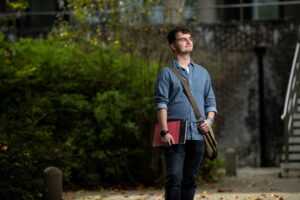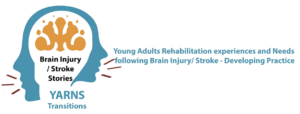Welcome to a new member of the YARNS Transitions team!
In this blog, we are happy to welcome and introduce a new addition to the YARNS Transitions team, Mr Oisín Cleary, a PhD Researcher who studied at Ulster University (Coleraine) in Northern Ireland.
About our Research Fellow, Mr (Soon to be Dr!) Oisín Cleary
In October 2023, we advertised a Research Fellowship position, aiming to recruit a researcher with experience in carrying out empirical research on young adults with Acquired Brain Injury (ABI). The individual in this position will contribute to the development of a nurse-led, psychosocial intervention using a realist approach among young adults with ABI. Following the application process, Mr Oisín Cleary was offered this Research Fellowship role and began in February 2024. Using a Q&A format, Oisín is sharing his background, motivations and expectations of joining the team, where his experience demonstrates several similarities to the core aims of the original YARNS project back in 2020.
Oisín, tell us a little about yourself.
Of course! At the time of this Q&A I am 26 years old, born and raised in Northern Ireland. My interests are all pretty nerdy, as I enjoy playing videogames, boardgames and Dungeons & Dragons with my friends. I also go on hikes and treks regularly and am fond of the occasional comic book. Lastly, I’ve a big fluffy dog called Bear and he’s awesome.


What is your academic/professional background?
My academic background and interests are grounded in the study of Psychology where I received a First-Class Honours Award in 2020 at Ulster University, Coleraine. That same year, I applied and was offered a DfE scholarship to work on my PhD project titled, ‘The Impact of Younger Stroke’ at Ulster University. This project, similar to the YARNS team’s, was centred around investigating young adults with ABI (specifically stroke survivors) and how their lives, and the lives of those around them, was impacted following their injury. At the time of this blog, I am happy to say that I have successfully defended my PhD thesis and am expected to formally receive my doctorate this year!
How did you know about the YARNS team?
As I approached the end of my PhD research, I began looking at future research opportunities that aligned with my background. After some investigation, and with some help of my PhD supervisor, Dr Niamh Kennedy, I was delighted to find a research team who’s core goals aligned with my own research.
What motivated you to apply and join the team?
Aside from pursuing young stroke (and ABI) research, I often found that pursuing my PhD was a solitary adventure (one that I thoroughly enjoyed). Moving on from this, I was very keen to work in a team setting which incorporated a similar research area (one aligning with my background in psychology or in stroke research). So, the YARNS team seemed to fit that bill quite nicely. As a bonus, I’d never been to Edinburgh before so now I have the perfect excuse!

What are your expectations about the project?
I expect that this project is going to make some necessary and important changes regarding young adults with ABI in UK healthcare. On a more personal level, I expect to gain even further experience research and develop my skills as an early career researcher.
What are the main challenges you expect to face?
Honestly? The biggest challenge I expect to face is people pronouncing my name! Beyond that, I can imagine finishing off my thesis corrections whilst keeping up-to-date with the YARNs timeline may require some good time management. I am confident that neither of these will be an issue and I enjoy a challenge anyway! 🙂
____________________
The YARNS Transitions project is working to develop rehabilitation approaches using the expertise of those with brain injury. It will provide nurses with ways to support and enable young people (18-45) who have experienced a brain injury to progress and adapt through their rehabilitation journey and move on with their lives. Why nurses? Evidence suggests that upscaling the nursing workforce is essential to develop cost-efficient neurological rehabilitation services and improve health outcomes(1). The project builds on previous research(2) that led to the development of the PGCert Neurological Rehabilitation and Care (Online) and promising evidence of its impact on service provision(3,4). The project contributes to nursing workforce development by building research capacity to develop and evaluate needed interventions.

Calling for young adult with acquired brain injury survivors!
If you live in the UK and would like to help guide our research project, please contact us at our email address, yarnspro@ed.ac.uk or social media, X @YANRSproject . We would love to know any insights you may have to improve our work.
We are looking forward to hearing from you!
References
- L. Tinelli, M. Knapp, C. Policy, E. Centre, and T. London, “Exploring the economic case for investing in advanced practice nurse training : an innovative nursing role to support the delivery of specialist coordinated neuro-rehabilitation services for young adults following a stroke,” 2020. [Online]. Available: file:///Users/lissetteaviles/Downloads/LSE Report 2020.pdf.
- A. Holloway et al., “Young Adults Rehabilitation Needs and Experiences following Stroke (YARNS): A review of digital accounts to inform the development of age-appropriate support and rehabilitation,” J. Adv. Nurs., vol. 78, no. 3, pp. 869–882, 2022, doi: 10.1111/jan.15076.
- The University of Edinburgh, “Neurological Rehabilitation and Care (Online Learning) PgCert,” Postgraduate Taught, 2023. https://www.ed.ac.uk/health/subject-areas/nursing-studies/postgraduate-taught/neuro-rehab-online-certificate (accessed Jul. 23, 2023)
- L. Avilés, A. Holloway, C. Chandler, and S. Malden, “Developing nursing leadership in neurorehabilitation: a qualitative programme evaluation,” in 42nd Annual International Nursing & Midwifery Research and Education Conference, 2023.




Recent comments